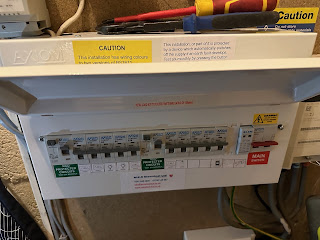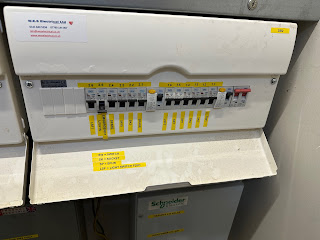 |
| EICR Glasgow |
A Comprehensive Guide to Landlord Compliance and Required Certifications in Glasgow
As a landlord in Glasgow, navigating the maze of regulations and compliance requirements can be challenging, but it's crucial for ensuring your property is legally rentable and safe for tenants. Staying compliant not only protects your investment but also safeguards your tenants’ well-being. This blog will walk you through the key certifications and compliance obligations that landlords in Glasgow must fulfill.
1. Electrical Installation Condition Report (EICR)
An Electrical Installation Condition Report (EICR Glasgow) is one of the most important certifications required by landlords. This report assesses the condition of the electrical installations in your property to ensure they are safe and fit for use.
- Legal Requirement: Since December 1, 2015, it has been mandatory for landlords in Scotland, including Glasgow, to have an EICR carried out at least every five years. This is in accordance with the Housing (Scotland) Act 2006.
- What It Covers: The EICR checks the wiring, fuse boxes, earthing, and bonding, among other things, and identifies any potential electrical hazards.
- Action Required: If the EICR identifies any issues classified as ‘C1’ (danger present) or ‘C2’ (potentially dangerous), these must be rectified immediately to remain compliant.
2. Energy Performance Certificate (EPC)
An Energy Performance Certificate (EPC) is essential for all rental properties. It provides an energy efficiency rating for the property, ranging from A (most efficient) to G (least efficient).
- Legal Requirement: All rental properties in Glasgow must have a valid EPC before they are let. The certificate is valid for 10 years.
- Minimum Rating: From April 2020, rental properties must achieve a minimum EPC rating of E before they can be let to new tenants or have an existing tenancy renewed.
- Importance: An EPC not only informs prospective tenants about energy costs but also offers recommendations on how to improve energy efficiency, which can enhance the property’s appeal and value.
3. Gas Safety Certificate
If your property has any gas appliances, a Gas Safety Certificate (CP12) is mandatory. This certificate ensures that all gas appliances, fittings, and flues are safe and working correctly.
- Legal Requirement: Landlords must arrange an annual gas safety check by a Gas Safe registered engineer. A valid Gas Safety Certificate must be provided to tenants at the start of the tenancy and within 28 days of the annual check.
- What It Covers: The check includes gas boilers, stoves, and any other gas appliances, as well as the condition of flues and ventilation.
- Compliance: Failure to comply can result in significant fines and, more importantly, puts tenants at risk of carbon monoxide poisoning or gas leaks.
4. Legionella Risk Assessment Glasgow
Legionella is a bacteria that can cause Legionnaires’ disease, a potentially fatal form of pneumonia. As a landlord, you are responsible for assessing and controlling the risk of Legionella in your property.
- Legal Requirement: Under the Health and Safety at Work Act 1974, landlords must conduct a Legionella Risk Assessment to identify and manage any potential risks in the water system.
- Frequency: While there is no specified timeframe for how often this assessment should be conducted, it is advisable to review it regularly, especially when the property's water system undergoes any changes.
- What It Covers: The assessment should evaluate the risks associated with water systems, such as tanks, pipes, and air conditioning units, and ensure that appropriate control measures are in place.
5. Fire Safety Compliance
Ensuring your property is fire-safe is another crucial aspect of landlord compliance.
- Smoke Alarms: All rental properties in Glasgow must have smoke alarms installed in the living room, hallways, and landings. These alarms should be interconnected so that if one is triggered, they all sound.
- Heat Alarms: A heat alarm must be installed in the kitchen.
- Carbon Monoxide Detectors: If your property has a fuel-burning appliance, such as a gas boiler or stove, a carbon monoxide detector must be installed in the room where the appliance is located.
6. Private Landlord Registration
All landlords in Glasgow must register with the Scottish Landlord Register before letting out their property.
- Legal Requirement: It is illegal to rent out a property in Glasgow without being registered. This registration ensures that landlords meet the legal requirements and are fit to rent out properties.
- How to Register: Registration can be completed online, and it involves a fee. You must renew your registration every three years.
- Penalties for Non-Compliance: Letting a property without being registered can lead to substantial fines and potentially being banned from letting properties in the future.
7. Tenancy Deposit Scheme
If you take a deposit from your tenants, you are required by law to place it in a government-approved Tenancy Deposit Scheme (TDS).
- Legal Requirement: The deposit must be placed in the scheme within 30 working days of the tenancy start date. You must also provide tenants with information about the scheme and how their deposit is protected.
- Schemes Available: There are three approved schemes in Scotland: Letting Protection Service Scotland, SafeDeposits Scotland, and MyDeposits Scotland.
- Importance: This protects the tenant’s deposit and ensures it is returned to them at the end of the tenancy, provided they meet the terms of the lease.
Conclusion
Compliance with landlord regulations in Glasgow is not just about avoiding fines; it’s about providing a safe, efficient, and legally compliant home for your tenants. By staying on top of these certifications and requirements, you protect your investment, ensure tenant safety, and maintain a positive reputation as a responsible landlord. Regularly reviewing and updating your certifications is key to staying compliant in the ever-evolving landscape of property rental regulations.





